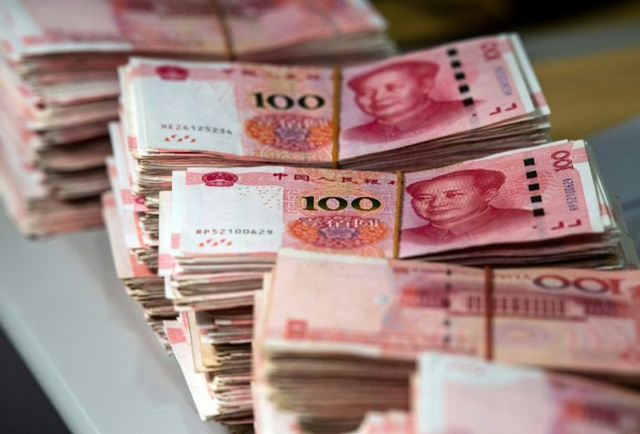
Kampala, Uganda | THE INDEPENDENT | The Bank of Uganda had downplayed talk of negative effects on the global economies in light of the developments around the US dollar and the renminbi, the Chinese currency. Talk of a possible US dollar collapse has dominated international headlines, with some terming it imminent, as some countries adopt the yuan, the primary unit of the renminbi, drawing questions as to what this would mean for the US and other economies like Uganda.
Economists, however, believe that the talk of a dollar collapse is far-fetched because whatever happens, it draws its strength from the strongest economy in the world, the US. Bank of Uganda Deputy Governor, Dr. Michael Atingi-Ego says whether countries will adopt the yuan will depend on individual trade and economic relationships with China, but admits the currency is rapidly gaining significance.
Uganda’s trade and debt stock with China has been growing sharply over the last one and a half decades, with the country accounting for about a third of the total foreign debt and the biggest share of commercial loans. The same goes for most of Africa, while China has also dominated investment in public infrastructure on the continent.
Dr. Adam Mugume, the Executive Director of Research at BOU says if the country’s trade with China is growing it will naturally make it the obvious choice to adopt the yuan as a preferred currency.
Of the world’s trade transaction value, the yuan accounts for 15 percent as opposed to 25 percent of transaction volumes done in the dollar. He says that it is a healthy development if there are other currencies coming up to challenge the dollar.
According to Forbes, “a currency collapse is when a country’s currency loses all its value and becomes practically worthless in day-to-day use, either as a result of political or economic upheaval, hyperinflation or war”. While it is not common, it has happened before countries like Zimbabwe, Angola, Belarus, and Argentina have had to replace their currencies after failing to tame their value-losing trends.
The closest the Uganda Shillings went to that was in 1987 when the government issued a new currency regime, striking off three zeros in response to the high inflation that had followed 15 years of political and economic turmoil.
Forbes says though, that investors, should always be aware of such a risk and protect themselves against it, but say it is highly unlikely that the dollar can collapse.
What is not being ruled out, however, is the status of “most traded currency in the world” for the dollar, though this will also not be in the short run.
It can be argued that there is no war in the US nor is the economy experiencing an upheaval, after fears of a recession were also dismissed by the economic performance of the last quarter of 2022.
However, the US does have economic issues especially to do with the high inflation rate. For example, the US central bank, the Federal Reserve Bank, in a bid to tame inflation, raised interest rates to tame borrowing appetite, much like most regulators including the Bank of Uganda did.
Interest rate hikes affect the value of government treasuries because the price must fall so as to give a competitive yield matching the yield of the current interest rates. In the case of the US, this affected the assets of banks which had sizable amounts in bills and bonds, like Silicone Valley Bank. When faced with many depositors withdrawing their money, it was forced to sell the bills and bonds at a loss, hence its collapse. BOU Executive Director of Supervision, Timubweine Twinemanzi says this situation was swiftly dealt with and does not expect it to have any further effects on the economy.
But there are other issues that could put pressure on the dollar and China has been working at it, intentionally or unintentionally, as it bids to increase the value of the yuan in the international trade arena. This involves making deals with trading partners featuring the use of the yuan instead of other currencies. Late last year, the yuan jumped to fifth from the eighth most traded currency in the world behind the Dollar, the Euro, the Japanese Yen, and the Pound Sterling, according to the Bank for International Settlements.
According to a report issued by IMF in September, the Chinese yuan accounted for 2.88 percent of global foreign currency reserves in the second quarter of 2022. Last month, the Central Bank of Brazil announced that the yuan had become the second most important currency in Brazilian foreign reserves after the Euro, reflecting the deepening economic ties between the two trading partners.
Earlier this year, China and Brazil signed an agreement on setting up yuan clearing house arrangements that would facilitate bilateral trade and investment, so as to reduce the dollar dominance. Over the last year, the yuan has become the most traded foreign currency in Russia as Western sanctions sidelined the country from much of the global financial industry.
Trade between the two countries hit a record of 190 billion dollars last year, with the two currencies dominating much of the payments, according to Bloomberg. Earlier this year, Saudi Arabia agreed with China to sell the oil to the Asian Tiger in the yuan, further boosting the strength of the currency.
Several other developments are giving credence to the “de-dollarisation of world trade” talk.
The demand for the dollar could also be affected, not by China and the yuan, but by other countries trading in alternative currencies. Kenya, for example, has a deal with Saudi Arabia to buy oil using shilling instead of traditional dollar usage.
China, Brazil, and Russia are the biggest of the BRICS economies, and their currency moves are expected to influence the other members; India and South Africa. The worry for the US and the dollar will also be increased by the impending expansion of the trading group which has received applications from Nigeria, Algeria, Iran, Argentina, Egypt, Indonesia, and Saudi Arabia, some of the world’s largest developing economies.
The recent historic handshake and the ongoing talks between Iran and Saudi Arabia, courtesy of China, are also seen as a boost for Chinese political and economic influence. The enmity between the two most powerful Middle east countries has remained strong courtesy of the US, but analysts say, Saudi Arabia is increasingly growing cold feet due to the US reluctance to help on the war in Yemen and the 2021 abrupt withdrawal from Afghanistan.
While these new developments are poised to nip at the dollar, it will take time and consistency for the renminbi to overtake the greenback and the world’s most preferred currency, either for trade or currency reserves. The US Dollar maintains more than 80 percent of currency trade and reserves, and BOU’s Mugume says the Chinese currency is still far from measuring up to the dollar’s strength and preference.
*****
URN
 The Independent Uganda: You get the Truth we Pay the Price
The Independent Uganda: You get the Truth we Pay the Price



